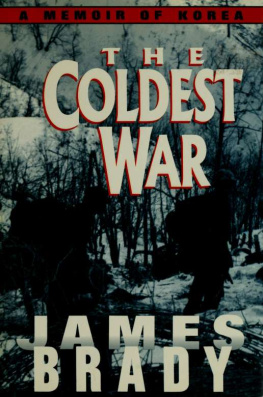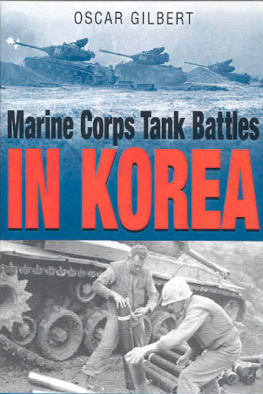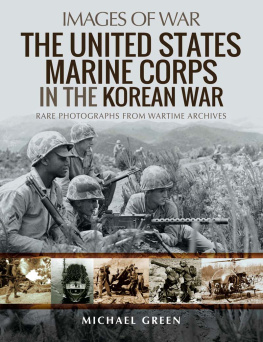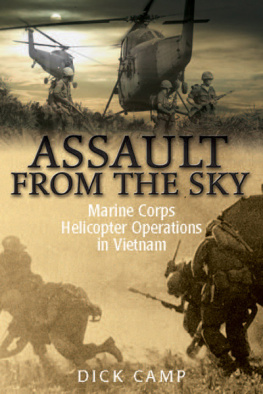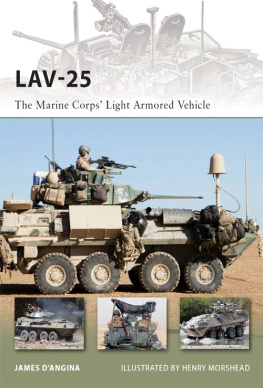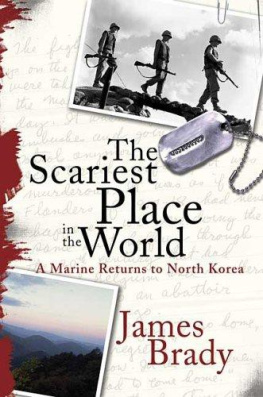The Coldest War
A Memoir of Korea
James Brady
13
Well," said Captain Chafee, "we've had worse tours." "It'll be a bad reserve," the executive officer said. "You're probably right," Chafee agreed. "Of course I'm right," Red Philips said. "Tours can be good or they can be bad. Reserve areas are always bad."
I was puzzled by this exchange but too green to say anything. A month later, when we went back up to the line, I understood. By then the best thing about the month in reserve was that when it came to an end, I was in command of a rifle platoon.
The regimental reserve area was in a valley, ten miles behind the line. The camp stretched out along the bank of a stream running too fast to freeze, studded with smooth, rounded rocks. Where the rocks protruded into the clear mountain air, they were iced. Now in mid-December it was truly winter, the weather we'd all read about and feared after what happened to the marines a year before up at the Chosin Reservoir. The ground was completely white, the mountains heavy with snow. At night the temperature dropped easily below zero Fahrenheit. It was still autumn on the calendar but North Korea had a different calendar. On the west bank of the little stream was a gook camp, service corps personnel and kids teenaged and younger who slipped across the stream to work as number one boys. It was all strictly against the rules, and Colonel Gregory let it be known it was against the rules. Then he picked out a sprightly youngster for himself.
That's how it is in the Marine Corps. There are rules and a subtle understanding some of them are to be broken. Colonels broke rules, I suppose generals did, enlisted men broke them, I broke them whenever I could with circumspection, but Chafee never. Captain Chafee kept the rules. Not that he was prissy. It simply did not seem to occur to Chafee to cut corners. Maybe it was his legal training. Take burp guns. Burp guns had an easily identifiable sound, and though they were not greatly accurate, they fired off lead in a hurry. As souvenirs, they were superb. Marines gathered burp guns as stoop labor picked beets. As we came off the hne, half the marines seemed to have one; I saw one man with three. Then an order came down from Division, a new rule, an anti-burp gun rule. Chafee had the burp guns taken and tagged with the owner's name and sent to the rear. There was some nonsense about giving the men receipts, but even with Chafee regulations went only so far and then reason took over. He did not play out the farce of receipts but merely told people he doubted they would see their burp guns again. Yet in this the captain was not entirely correct, for within a week marines on various errands to rear areas reported that at Corps and at Army, burp guns were being peddled by army troops for twenty-five dollars apiece. It was enough to disillusion a man, Red Philips remarked, if a man were silly enough to have illusions.
Red and the captain had been right about reserve areas. Nearly five thousand men camped in tents had to be kept busy. Most days we trained and drilled and polished and oiled and held lectures. After dark, which was when most of the fighting took place now, in weather that came from Siberia down into the valley off the high hills, we ran night problems. They were as exhausting and only marginally less dangerous than the long patrol of Bob Simonis. Supper eaten, the cold night fastened down, a time when quiet, lazy talk under alcohol was what was wanted, they rooted us out into the company street and marched us into low hills drifted deep with snow, treacherous with iced footpaths, downed trees, and the occasional mine, to stage dummy assaults on empty bunkers. We lost men, one here to a mine, one there to a broken leg in the stream, another to an accidental discharge. There were too many of those. Five thousand men under arms, people got hurt. Few nights passed without somewhere in the regiment a wild shot whipping harmless through the tent or sometimes into flesh and breaking bone. It was how we lost Dodge, the mortar sergeant, though as might be expected with Dodge, that story had a twist.
Sergeant Tallent, a machine-gun sergeant, had gotten a botde, and he and Dodge, as sergeants will, made use of it. Some time after midnight, the ceremonial round went off. When people got there, Tallent lay across a bunk swamped with his own blood and Dodge was tidying the tent. Investigating officer put it down at first to an accidental discharge. Ten days later, Tallent recovering, the story came out. Stimulated by drink and good company. Dodge had proposed a round of Russian roulette. Other sergeants in the party demurred, suggesting since it was his idea, Dodge had all rights to it, and they left. Tallent, less sage or perhaps more drunk, stayed on. A quarrel developed, a struggle, with Dodge forcing the gun to Tallent's head. He probably meant just to frighten, but with Dodge you never knew. At the court-martial Dodge cheerfully admitted doing it, claiming to have been befuddled. Tallent got off with a reprimand and Dodge with six months' loss of pay and being broken to private. Private, Dodge sneered, he had been there before; the important thing was his mortars and those they couldn't take away from him.
For me, with no intention of playing Russian roulette, mines were the fear. This was ground that had been fought over before, and so there were mines, put down by both sides, no one knew quite where or what type. Battalion laid on a night problem that involved the scaling of a terrible cliff, a thousand feet nearly vertical with a frozen stream hanging down the height of it like a waterfall. I was assigned the point and got to the top first, climbing very fast, cursing my people steadily and forcing the pace. We got there so quickly we found the "enemy" troops, from Fox Company, still in their sleeping bags. I was pleased at what we'd done; I was toughening now and had barely felt the climb. But it was fear of mines that pushed me up the cliff, as if by going fast I might skim across the mines without exploding them. It was stupid and back in my tent I felt the drained sense of having done something well but for the wrong reason. I was going to have to do something about this phobia of mines. Easy to say. I kept seeing myself without legs.
Not everything about being in reserve was grim. We had showers, we slept on bunks in big tents, the oil stoves reeked but threw warmth, and when we weren't being chivvied and driven, there was something to it redolent of a boys' camp.
The number-one boy we had, Chang, was fine, an ugly little con-niver about eleven with a deep scar over one eye. I romanticized it had been put there by a Japanese samurai sword during the Occupation. Chang fetched and carried and kept the stove going and once served us fried squid from the gook camp. We had movies in the big mess tent, and sometimes we sneaked in Chang. He did not believe what he saw, thinking everything was Hollywood make-believe, even the city of New York. It was touching, this ignorance of what it was like beyond Korea, and I wanted to do something for the boy. In the end, I did nothing; none of us did.
As Christmas neared there was a USO show. I felt about the USO the way Chang did about Technicolor movies. They were fine but they didn't really exist. Bob Hope might visit Europe but not here.
Yet there it was, a USO troupe on a wooden platform in the middle of a drill field playing an act of Born Yesterday. Paul Douglas and his wife, Jan Sterling, and a Broadway juvenile named Keith Andes I'd once seen in a musical. Miss Sterling wore a short frilly dress with pink long Johns under it, showing her legs and playing dumb for a few thousand marines while dry snow whipped in on a heavy, pushing wind. I was a New Yorker and I'd seen plenty of shows, but I'd never enjoyed theatre more than I did right there sitting cross-legged on the ground in the snow. I resolved that after the war I would go every week to see a play, if only from the balcony or standing room. I wanted to go up and thank Mr. Douglas and the others for coming, to say something polite. But they were hurried offstage to thaw out and I didn't have the chance.

